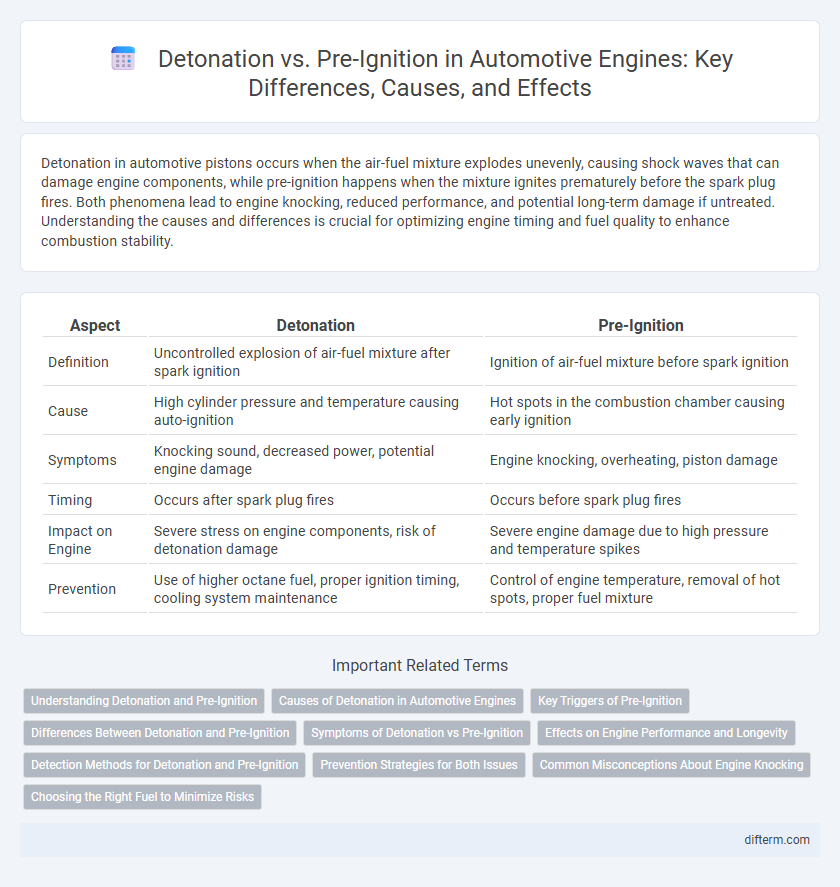Detonation in automotive pistons occurs when the air-fuel mixture explodes unevenly, causing shock waves that can damage engine components, while pre-ignition happens when the mixture ignites prematurely before the spark plug fires. Both phenomena lead to engine knocking, reduced performance, and potential long-term damage if untreated. Understanding the causes and differences is crucial for optimizing engine timing and fuel quality to enhance combustion stability.
Table of Comparison
| Aspect | Detonation | Pre-Ignition |
|---|---|---|
| Definition | Uncontrolled explosion of air-fuel mixture after spark ignition | Ignition of air-fuel mixture before spark ignition |
| Cause | High cylinder pressure and temperature causing auto-ignition | Hot spots in the combustion chamber causing early ignition |
| Symptoms | Knocking sound, decreased power, potential engine damage | Engine knocking, overheating, piston damage |
| Timing | Occurs after spark plug fires | Occurs before spark plug fires |
| Impact on Engine | Severe stress on engine components, risk of detonation damage | Severe engine damage due to high pressure and temperature spikes |
| Prevention | Use of higher octane fuel, proper ignition timing, cooling system maintenance | Control of engine temperature, removal of hot spots, proper fuel mixture |
Understanding Detonation and Pre-Ignition
Detonation occurs when the air-fuel mixture explodes prematurely, causing shock waves that damage engine components, while pre-ignition happens when the mixture ignites before the spark plug fires due to hot spots in the combustion chamber. Both phenomena disrupt optimal engine performance and increase the risk of engine knock and overheating. Understanding the distinct causes and effects of detonation and pre-ignition is crucial for tuning engines and selecting the correct fuel octane rating to enhance efficiency and longevity.
Causes of Detonation in Automotive Engines
Detonation in automotive engines is primarily caused by excessive cylinder pressure and temperature, which lead to spontaneous combustion of the air-fuel mixture before the spark plug fires. High engine load, low octane fuel, advanced ignition timing, and hot spots in the combustion chamber such as carbon deposits increase the likelihood of detonation. Maintaining proper cooling, using high-quality fuel, and ensuring correct ignition timing are crucial to prevent engine knocking and damage.
Key Triggers of Pre-Ignition
Key triggers of pre-ignition in automotive engines include excessively high intake air temperatures, advanced ignition timing, and the presence of hot spots within the combustion chamber such as deposits on spark plugs or piston crowns. Low-quality fuel and lean air-fuel mixtures also significantly increase the risk by elevating combustion chamber temperatures. These factors cause the air-fuel mixture to ignite prematurely, leading to engine knocking and potential damage.
Differences Between Detonation and Pre-Ignition
Detonation occurs when fuel-air mixture explodes violently after the spark ignition, causing sharp knocking noises and engine damage, while pre-ignition happens when the mixture ignites prematurely due to hot spots in the combustion chamber before spark occurs. Detonation results from abnormal combustion pressure spikes, leading to piston and cylinder head damage, whereas pre-ignition can cause severe engine overheating and piston melting due to uncontrolled early combustion. Understanding these differences is crucial for optimizing ignition timing, fuel quality, and engine design to prevent power loss and mechanical failure.
Symptoms of Detonation vs Pre-Ignition
Detonation symptoms include knocking or pinging noises during acceleration, reduced engine power, and increased exhaust gas temperatures. Pre-ignition symptoms often involve severe engine knocking, overheating, and potential piston damage due to early combustion before spark ignition. Both conditions negatively impact engine performance and longevity but differ in ignition timing and resultant component stress.
Effects on Engine Performance and Longevity
Detonation causes rapid pressure spikes that damage piston rings, cylinder walls, and valves, reducing engine efficiency and lifespan. Pre-ignition leads to overheating and excessive stress on engine components, often resulting in warped pistons and cracked cylinder heads. Both phenomena degrade combustion quality, causing power loss, increased emissions, and costly repairs.
Detection Methods for Detonation and Pre-Ignition
Detection methods for detonation and pre-ignition in automotive engines rely primarily on advanced knock sensors and in-cylinder pressure sensors that monitor combustion irregularities in real time. Accelerometer-based knock sensors detect high-frequency vibrations caused by detonation, while optical sensors and ion current sensors provide early identification of pre-ignition by sensing abnormal flame front behavior. Machine learning algorithms integrated with sensor data improve the accuracy of distinguishing between detonation and pre-ignition events, enabling precise engine tuning and preventing damage.
Prevention Strategies for Both Issues
Effective prevention strategies for detonation and pre-ignition in automotive engines include maintaining proper ignition timing and using high-octane fuel to resist abnormal combustion. Implementing advanced engine control units (ECUs) with knock sensors enables real-time adjustments to optimize combustion and prevent engine damage. Regular maintenance of the cooling system and ensuring correct air-fuel mixture also play crucial roles in reducing the risks of detonation and pre-ignition.
Common Misconceptions About Engine Knocking
Engine knocking is commonly mistaken as solely caused by detonation, but pre-ignition also plays a critical role in damaging combustion processes. Detonation refers to the explosive ignition of air-fuel mixture after spark timing, while pre-ignition happens when the mixture ignites prematurely due to hot spots, leading to higher cylinder pressures and potential engine damage. Understanding the distinct characteristics and causes of both detonation and pre-ignition is essential for accurate diagnostics and optimizing engine performance.
Choosing the Right Fuel to Minimize Risks
Selecting the appropriate fuel with a higher octane rating is crucial to minimizing detonation and pre-ignition in automotive engines, as it resists premature combustion under high pressure. Modern premium fuels contain additives that enhance combustion stability, reducing the likelihood of engine knocking and subsequent damage. Ensuring the fuel matches engine specifications optimizes performance and longevity by preventing abnormal combustion events.
detonation vs pre-ignition Infographic

 difterm.com
difterm.com